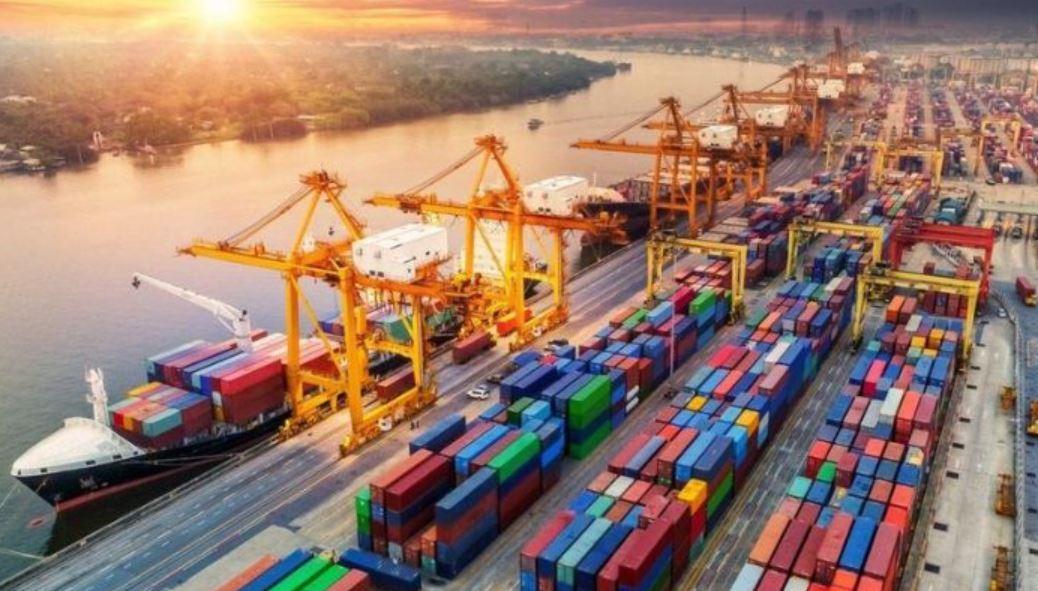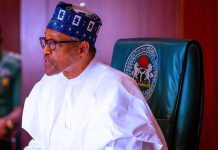Abba Hamisu Sani
Africa-Press – Nigeria. Nigeria’s trade with other African countries grew by 610 trillion naira ($3.13 billion) in the first half of 2025, with fresh figures from the National Bureau of Statistics showing that total trade rose to 4.82 trillion naira, compared with 4.21 trillion naira ($2.89 billion) recorded in the same period of 2024.
The latest numbers highlight both the resilience of regional trade and the distortions created by the weakening of Nigeria’s currency (naira).
The quarterly trend revealed contrasting movements. In the first quarter of 2025, trade fell slightly to 1.86 trillion naira from 2.24 trillion naira in the first quarter of 2024.
However, the second quarter delivered a sharp rebound, with trade climbing to 2.97 trillion naira, against 1.98 trillion naira in the second quarter of 2024.
This near-1-trillion-naira jump in the second quarter was the decisive factor behind the overall increase recorded in the half-year period.
Nigerian Exports within the First Six Months of 2025
Exports accounted for most of the growth. Nigeria exported goods worth 4.82 trillion naira in the first six months of 2025, compared with 4.21 trillion naira in the same period of 2024.
The expansion was particularly evident in the second quarter of 2025, when exports rose to 2.97 trillion naira, up from 1.97 trillion naira in the second quarter of 2024.
Imports also grew, but at a slower pace, reaching 1.82 trillion naira in the first half of 2025, from 1.13 trillion naira a year earlier.
The figures showed that Nigeria remained a net exporter to Africa. The country recorded a trade surplus of 2.99 trillion naira in the first half of 2025, only slightly lower than the 3.08 trillion naira surplus recorded in the first half of 2024.
The surplus narrowed in the first quarter of 2025, when Nigeria’s import bill surged to 1.00 trillion naira, more than double the 401.8 billion naira recorded in the first quarter of 2024, while exports dropped slightly to 1.85 trillion naira from 2.24 trillion naira in the same quarter of 2024.
This reduced the surplus to 852.8 billion naira, compared with 1.83 trillion naira a year earlier. In the second quarter of 2025, the trade balance widened again to 2.15 trillion naira as exports accelerated more strongly than imports.
The detailed breakdown further confirmed the changing trade structure. Total exports in the first half of 2025 amounted to 4.82 trillion naira, up by 610 billion naira from 4.21 trillion naira in the first half of 2024, while imports increased to 1.82 trillion naira from 1.13 trillion naira within the same period.
Although imports are still lower than exports, the sharp rise indicates that regional suppliers are beginning to reclaim ground lost in the years of import compression triggered by foreign-exchange and policy restrictions.
Foreign exchange shortages and policy restrictions
Foreign exchange shortages and policy restrictions weighed on trade, with exports at $1.76 billion in 2024, while imports stood at $1.19 billion, slightly above the $1.13 billion recorded the previous year.
In 2019, however, exports reached $4.93 billion and imports $2.89 billion, highlighting how hard-currency trade volumes remain far below pre-pandemic benchmarks.
The discrepancy between naira and dollar figures reflects the steep depreciation of the currency over the past six years.
In 2019, 1.38 trillion naira in Africa trade equaled $4.51 billion at an average exchange rate of ₦306.73 per $1.
By 2025, however, ₦4.82 trillion in trade was worth only $3.13 billion at an exchange rate of ₦1,538.50 per $1.
This ~80% depreciation means that trade values in naira appear inflated even when real volumes and hard-currency receipts are weaker.
Despite the distortions, Nigeria’s position as a net exporter within Africa remains intact. The country’s export base—particularly crude oil and related products—continues to dominate its trade with African partners.
Nigeria’s trade with Africa surges as it faces friction with the U.S.
The surge in intra-African trade comes at a time when Nigeria faces intensifying friction with the United States.
Earlier this year, the United States cut its imports of Nigerian goods by more than 40% in just one month, heightening concerns about the fragile nature of Nigeria’s trade relationship with one of its most strategic partners.
Figures from the U.S. Census Bureau and the Bureau of Economic Analysis show that imports of Nigerian goods dropped from $639 million in June 2025 to $379 million in July—a 41% decline.
The collapse in imports coincided with a sharp fall in U.S. exports to Nigeria during the same month, from $919 million in June to $584 million in July. Despite the dip in exports, Washington still recorded a surplus of $206 million in July, compared with $280 million in June.
Between January and July 2025, America exported goods worth $3.92 billion to Nigeria while importing $3.14 billion in return, leaving the U.S. with a year-to-date surplus of $781 million. But July’s steep contraction in Nigerian exports underlines a significant weakening in Nigeria’s traditional surplus position and its broader access to the American market.
Trump’s raising tariffs on Nigerian exports
In late July, Trump signed an executive order raising tariffs on Nigerian exports from 14% in April to 15% under his “reciprocal” tariff regime targeting countries that run surpluses against the U.S. Although crude oil—the backbone of Nigeria’s exports—has been exempted in some instances, uncertainty over tariff implementation has dampened U.S. import demand, especially for non-oil goods that are now directly affected by higher duties.
For Washington, the move is part of a broader recalibration of trade policy designed to shield domestic industries and reduce global trade imbalances.
But for Nigeria, the immediate outcome is shrinking access to a key market and erosion of its previously comfortable surplus with the U.S.
Nigeria is also grappling with the impending expiration of AGOA (African Growth and Opportunity Act), a trade scheme under which many African exports accessed U.S. markets tariff-free.
The lapse of AGOA raises new uncertainty for export sectors such as textiles and agriculture that had depended on U.S. access.
However, as U.S. demand for Nigerian exports falters, Nigerian traders and policymakers appear to be pivoting more decisively toward African markets.
Nigeria’s response to U.S. raising tariffs
Reacting to the American decision, Nigeria’s Minister of Industry, Trade and Investment, Jumoke Oduwole, said the country would not be stampeded into retaliatory action but would continue on its path of reform and diversification. The minister stated this in a recent press statement.
“Nigeria remains responsive: we are not reacting. We are focused on the eight-point agenda of President Bola Tinubu. We will continue to support domestic investors and expand market access for Nigerian business,” Oduwole said.
She noted that while the United States remains an important trade partner, Nigeria is strengthening its African Continental Free Trade Area (AfCFTA) strategy and boosting non-oil exports.
Business strategist and economic analyst Sani Bako said the development makes it necessary for Nigeria to strengthen business relationships with African countries hitherto neglected.
Dominating trading partners
Major export destinations within Africa include Côte d’Ivoire, South Africa, and Togo. South Africa is also a key import partner.
The analyst said the factors driving improved trade are: a strategic pivot towards Africa amid challenges in traditional markets, including uncertainty around the U.S. African Growth and Opportunity Act (AGOA); Nigerian traders and policymakers have increasingly focused on African markets.
“Growing participation in the African Continental Free Trade Area (AfCFTA) has facilitated trade with neighbouring countries by reducing trade barriers and expanding market access for Nigerian businesses.
Diversification of exports: while crude oil remains a major component of Nigeria’s exports, intentional government policies have bolstered the non-oil sector. Non-oil exports set a new record in 2024 and are on track to surpass that in 2025,” Bako said.
Role of the Dangote Refinery
Dangote Refinery has played a significant role by supplying refined petroleum products to other African countries, which were previously importing from outside the continent. This has boosted Nigeria’s intra-African trade.
The decline in Nigeria’s currency (naira) value has also made Nigerian exports more competitive on the continent. However, this again inflates local-currency trade figures and diminishes the real value in hard currency.
Challenges and remaining obstacles
Poor transportation networks (roads, ports, and railways) and unreliable energy supply continue to be major barriers to trade. Inefficient customs processes also lead to delays and increase the cost of doing business.
Sani Bako also cited fragmented and inconsistent government policies as hurdles to trade and infrastructure development.
“High cost of doing business: structural challenges like insecurity, corruption, and lack of effective judicial due process contribute to a high-cost environment, deterring some foreign investment,” he added.
Despite these challenges, Nigeria’s strategic focus on the African market and policy reforms suggest continued improvement in intra-African trade. The success of diversification efforts and investments in infrastructure will be critical to sustaining this growth and translating it into broader economic development.
For More News And Analysis About Nigeria Follow Africa-Press







